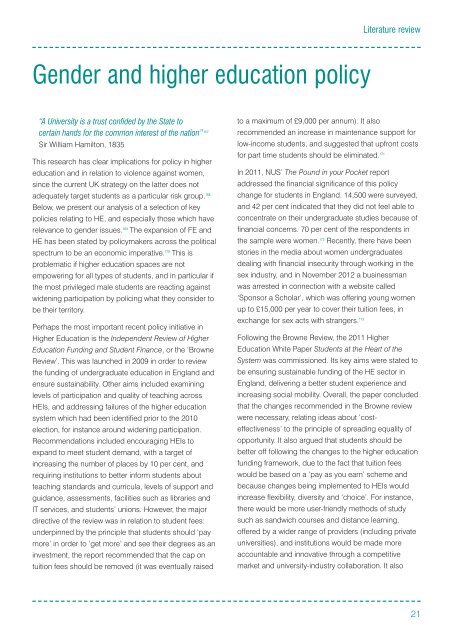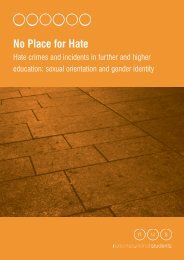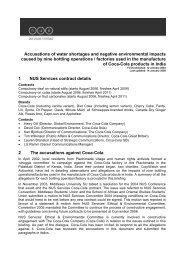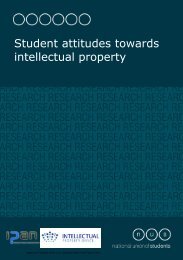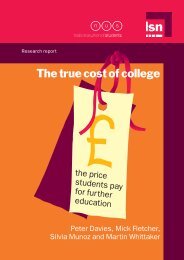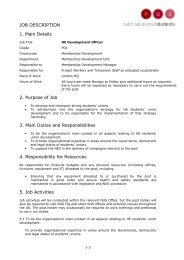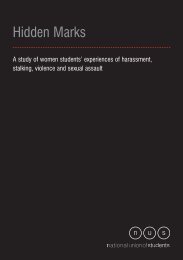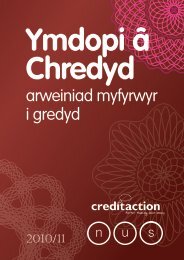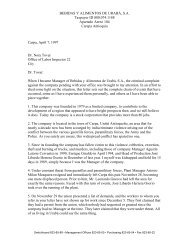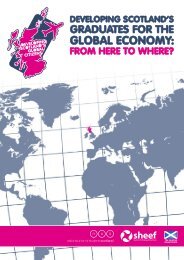'That's What She Said' report here. - National Union of Students
'That's What She Said' report here. - National Union of Students
'That's What She Said' report here. - National Union of Students
You also want an ePaper? Increase the reach of your titles
YUMPU automatically turns print PDFs into web optimized ePapers that Google loves.
Literature review<br />
Gender and higher education policy<br />
“A University is a trust confided by the State to<br />
certain hands for the common interest <strong>of</strong> the nation” 167<br />
Sir William Hamilton, 1835<br />
This research has clear implications for policy in higher<br />
education and in relation to violence against women,<br />
since the current UK strategy on the latter does not<br />
adequately target students as a particular risk group. 168<br />
Below, we present our analysis <strong>of</strong> a selection <strong>of</strong> key<br />
policies relating to HE, and especially those which have<br />
relevance to gender issues. 169 The expansion <strong>of</strong> FE and<br />
HE has been stated by policymakers across the political<br />
spectrum to be an economic imperative. 170 This is<br />
problematic if higher education spaces are not<br />
empowering for all types <strong>of</strong> students, and in particular if<br />
the most privileged male students are reacting against<br />
widening participation by policing what they consider to<br />
be their territory.<br />
Perhaps the most important recent policy initiative in<br />
Higher Education is the Independent Review <strong>of</strong> Higher<br />
Education Funding and Student Finance, or the ‘Browne<br />
Review’. This was launched in 2009 in order to review<br />
the funding <strong>of</strong> undergraduate education in England and<br />
ensure sustainability. Other aims included examining<br />
levels <strong>of</strong> participation and quality <strong>of</strong> teaching across<br />
HEIs, and addressing failures <strong>of</strong> the higher education<br />
system which had been identified prior to the 2010<br />
election, for instance around widening participation.<br />
Recommendations included encouraging HEIs to<br />
expand to meet student demand, with a target <strong>of</strong><br />
increasing the number <strong>of</strong> places by 10 per cent, and<br />
requiring institutions to better inform students about<br />
teaching standards and curricula, levels <strong>of</strong> support and<br />
guidance, assessments, facilities such as libraries and<br />
IT services, and students’ unions. However, the major<br />
directive <strong>of</strong> the review was in relation to student fees:<br />
underpinned by the principle that students should ‘pay<br />
more’ in order to ‘get more’ and see their degrees as an<br />
investment, the <strong>report</strong> recommended that the cap on<br />
tuition fees should be removed (it was eventually raised<br />
to a maximum <strong>of</strong> £9,000 per annum). It also<br />
recommended an increase in maintenance support for<br />
low-income students, and suggested that upfront costs<br />
for part time students should be eliminated. 171<br />
In 2011, NUS’ The Pound in your Pocket <strong>report</strong><br />
addressed the financial significance <strong>of</strong> this policy<br />
change for students in England. 14,500 were surveyed,<br />
and 42 per cent indicated that they did not feel able to<br />
concentrate on their undergraduate studies because <strong>of</strong><br />
financial concerns. 70 per cent <strong>of</strong> the respondents in<br />
the sample were women. 172 Recently, t<strong>here</strong> have been<br />
stories in the media about women undergraduates<br />
dealing with financial insecurity through working in the<br />
sex industry, and in November 2012 a businessman<br />
was arrested in connection with a website called<br />
‘Sponsor a Scholar’, which was <strong>of</strong>fering young women<br />
up to £15,000 per year to cover their tuition fees, in<br />
exchange for sex acts with strangers. 173<br />
Following the Browne Review, the 2011 Higher<br />
Education White Paper <strong>Students</strong> at the Heart <strong>of</strong> the<br />
System was commissioned. Its key aims were stated to<br />
be ensuring sustainable funding <strong>of</strong> the HE sector in<br />
England, delivering a better student experience and<br />
increasing social mobility. Overall, the paper concluded<br />
that the changes recommended in the Browne review<br />
were necessary, relating ideas about ‘costeffectiveness’<br />
to the principle <strong>of</strong> spreading equality <strong>of</strong><br />
opportunity. It also argued that students should be<br />
better <strong>of</strong>f following the changes to the higher education<br />
funding framework, due to the fact that tuition fees<br />
would be based on a ‘pay as you earn’ scheme and<br />
because changes being implemented to HEIs would<br />
increase flexibility, diversity and ‘choice’. For instance,<br />
t<strong>here</strong> would be more user-friendly methods <strong>of</strong> study<br />
such as sandwich courses and distance learning,<br />
<strong>of</strong>fered by a wider range <strong>of</strong> providers (including private<br />
universities), and institutions would be made more<br />
accountable and innovative through a competitive<br />
market and university-industry collaboration. It also<br />
21


